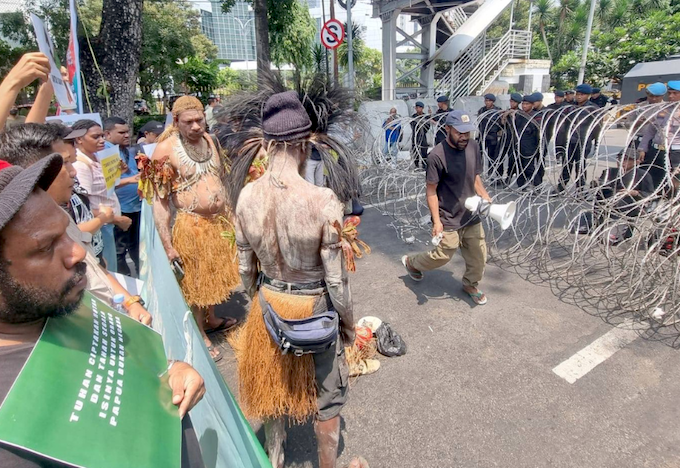Headline: Indonesia‘s Militarisation of West Papua Raises Alarm Amid Human Rights Concerns
As Indonesia prepares for President Prabowo Subianto’s inauguration last Sunday, the establishment of five new “Vulnerable Area Buffer Infantry Battalions” in West Papua has emerged as a contentious strategic initiative. While the Indonesian Army Chief-of-Staff, Maruli Simanjuntak, emphasizes benefits like development and prosperity for Papuan communities, deeper implications suggest heightened militarisation in a region already marred by violence and human rights abuse.
A Troubled Region
The newly formed battalions are part of a larger effort to combat ongoing unrest in areas such as Star Mountain, Nduga, and Maybrat. Armed Forces Chief General Agus Subiyanto stated that the primary objective is to facilitate government development, yet indigenous populations fear this will lead to further repression within a context of long-held autonomous aspirations.
Human rights violations in West Papua frequently go unreported, contributing to a widespread perception that these issues are mere collateral damage in a broader civil unrest scenario. The international community, including the United Nations and the Pacific Islands Forum (PIF), faces criticism for remaining largely silent amid these injustices.
Contextual Background and Concerns
The backdrop of these military escalations can be traced back to historical grievances surrounding land theft, particularly concerning Indigenous Papuan lands appropriated by the Indonesian government and foreign corporations. A tribunal held at Queen Mary University in London recently highlighted testimonies regarding this systemic exploitation linked to the mining, logging, and palm oil industries.
Indigenous Papuans are losing their lands without consent, posing serious threats to their rights, culture, and livelihood. The growth of non-Papuan settlers, fuelled by government policies, threatens to further marginalise Indigenous identities in their own territories.
Militarisation Under a Security Pact
The Indonesia-Papua New Guinea Defence Cooperation Agreement (DCA), recently activated, aims to bolster military operations along the PNG-West Papua border. The DCA includes plans to deploy technology such as military drones to closely monitor local communities, raising concerns about the potential impacts on civilian life.
As Prabowo takes on leadership, his controversial military track record evokes fears of a heavy-handed approach toward dissenting voices advocating for independence. The prospect of military forces being used to quash pro-independence movements adds to the tension already prevalent in West Papua.
Impacts on Indigenous Communities
The reality is grim. Ongoing military operations have resulted in significant displacement; a recent Human Rights Monitor update cites over 79,867 indigenous individuals internally displaced due to conflict since the commencement of the Damai Cartenz military operation in April 2018. In areas like Yahukimo, the humanitarian crisis is escalating as communities are forced to abandon their homes and traditional livelihoods.
Major issues include:
- Extrajudicial Killings: Underreported incidents often slip under the radar of international awareness.
- Forced Displacement: Increased military presence leads to the eviction of indigenous communities from their ancestral lands.
- Marginalisation and Poverty: Agricultural disruptions result in rising economic insecurity among the Papuan people.
A Call for International Action
Benny Wenda, leader of the United Liberation Movement for West Papua (ULMWP), recently expressed the urgent need for international attention to tackle the humanitarian crisis, stating, “Indonesia cannot hide their dirty secret any longer.” With growing concerns over human rights violations, there is an increasing demand for globally coordinated efforts to support the rights of West Papuans.
The lack of substantial dialogue between the Indonesian government and indigenous leaders only deepens the uncertainty surrounding West Papua’s future political landscape, prompting calls for an internationally mediated referendum on independence.
Potential Path Forward
The transition towards a peaceful and equitable resolution for West Papua appears fraught with difficulty. Experts advocate for more transparent military operations and engage local populations constructively to address grievances effectively.
The situation demands awareness, understanding, and action from individuals, the international community, as well as local governments. Engaging with the plight of the West Papuan people is essential, not just for their future but for regional stability and human rights advocacy.
As the global community watches developments unfold in West Papua, the challenge remains: will Indonesia recalibrate its approach to respect human rights and self-determination, or will the cycle of violence and repression continue?
Join the conversation below—share your thoughts on this pressing issue and how we might support the rights of Indigenous populations worldwide.

